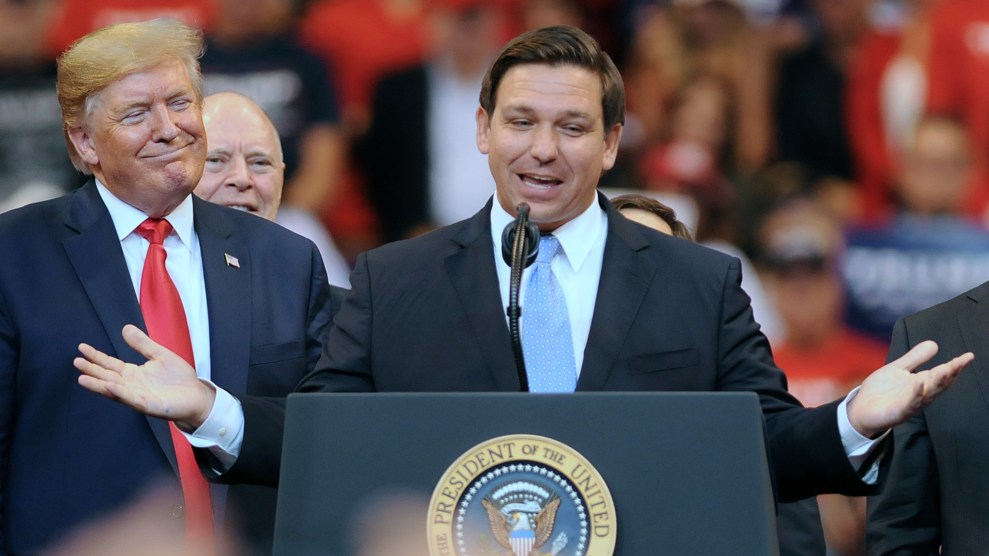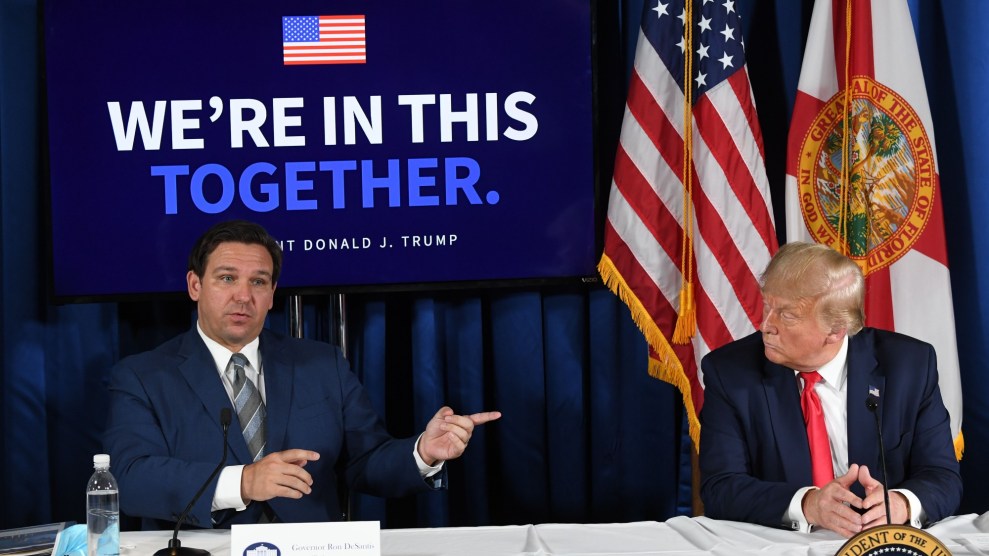
Former President Donald Trump and Florida Governor Ron DeSantis in 2019 at a rally celebrating Trump changing his legal residence to Florida.Paul Hennessy/Getty
On Tuesday, Breitbart published a long report exposing racist and anti-semitic text messages from Pedro Gonzalez, a somewhat well-known writer who contributes to Newsweek and is an editor at Chronicles magazine—a paleoconservative publication loosely on the New Right. From afar, that might seem odd. Breitbart? Calling someone else (and specifically another figure on the right) racist? The publication that had a vertical on “Black Crime”?
To understand why requires keeping an eye on the rifts and fissures in a group of hyper online, pseudo-intellectuals as they beef over who to choose in the Republican primary—and in the process engage in a potentially internecine, and at times baffling, war. Or, put another way: Gonzalez has publicly supported DeSantis; Breitbart has seemed to back Trump.
“The only reason my private messages—messages I exchanged with *Trump supporters* from a different, dumb season of my life—are being used against me is that I’ve become the most effective critic of Trump since jumping off the Trump train,” Gonzalez said in a statement, calling the article a “smear” meant to silence him.
Once allies who endorsed each other’s campaigns, Trump and DeSantis have been in a slow-simmering feud since at-least last summer when DeSantis’ autocratic aspirations as governor of Florida made him a national political figure. Gonzalez has been one of DeSantis’ most loyal soldiers, writing and tweeting incessantly about why the Florida Governor is superior to Trump.
As the primary continues, the debate seems clear. On one side, there are the MAGA loyalists who remain committed to their living Lost Cause. On the other side, there is a growing group of self-styled intellectuals who are now betting that DeSantis can deliver a version of Trumpism without the baggage of Trump.
The latter group can feel loud. (That is perhaps because, as The Daily Beast reported, the DeSantis campaign recruited a “secret Twitter army of far-right influencers.”) And their logic is straightforward. The DeSantis right thinks voters were more swayed by Trump’s accidental reinvention of Pat Buchanan—white identity politics with a dash of industrial policy and foreign isolationism—than Trump’s accidental magnetism. The question of DeSantis versus Trump is: Did voters like the rich, famous, and often hilarious television star who transformed politics into entertainment—whose rallies were like rock concerts, and who gave Americans permission to be the worst, most belligerent version of themselves—or did they like the policies he promised?
On paper, and from the vantage of a liberal harangued by emails warning of doom and asking for money, perhaps it appears little difference between these two men: DeSantis is just Trump with a brain. He says “cultural Marxism” and he might have paged through some Sam Francis or Oswald Spengler, but what is so different?
That ignores a key part of Trump: He often gestured at doing something terrible but failed to complete the task. This emboldened a series of right wing movements—from Charlottesville’s Nazis to the Claremont Review. But it did not satiate their desire. (And, one could argue, it meant he did not enact as many harmful policies that would’ve dissuaded voters.)
DeSantis, on the other hand, has acted boldly. He’s wielded the governor’s office as a bludgeon to bash queer people, Black people, teachers, public sector unions, Disney, the formerly incarcerated, and immigrants. He has no time for retail politics; for glad-handing retired boat dealers at Mar-a-Lago like Trump. This has attracted young, bookish right-wingers like Gonzalez.
But the problem for DeSantis is that in 2023 right-wing dorks are increasingly likely to cross-pollinate with the far right of the party, as Alex Pareene presciently predicted in 2017. Gonzalez’s boss at Chronicles is Paul Gottfried, one of Richard Spencer’s chief intellectual influences, who Tablet called a “philosophical lodestone for white nationalists.” In one of the texts leaked by Breitbart, Gonzalez praised two of the biggest heroes for young, online racists: Nick Fuentes and Bronze Age Pervert. “Like it or not, somewhere between BAP and Fuentes is the future,” Gonzalez wrote. “It will be open to race realism, it will be anti-Zionism, it will be hostile to LGBTQ, and it will prefer strength over weakness. All of those things were present in America 1950.”
The cleavage revealed by the Breitbart report will be important to watch as the Republican primary unfolds. Trump and his movement’s embrace of openly racist and fascistic rhetoric was bad. (Let’s not forget Trump’s private dinner with Fuentes and Kanye West.) But the migration of some sections of the right towards DeSantis is not because they find that disqualifying. It’s because they seem to believe DeSantis is competent enough to follow through.















